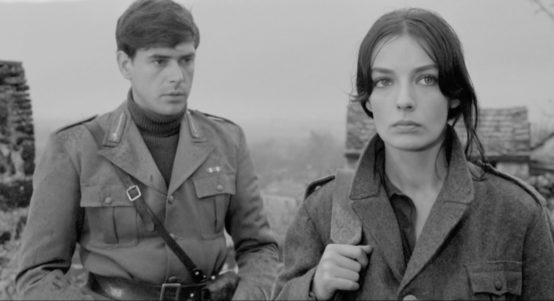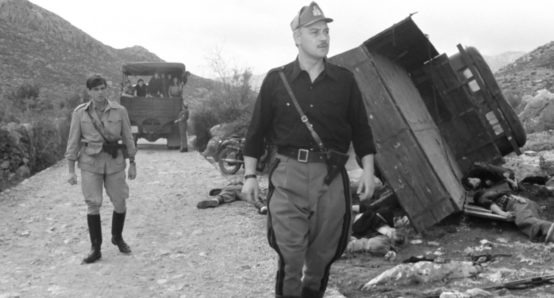Let’s take a rather unknown filmmaker from the General publicValerio Zurlini, of whom we think we have the chance, almost the privilege, to know some nuggets like The girl with the suitcase – came out recently. Let’s learn that one of his films, extremely rare, is currently on the screens. Let’s say that, thanks to the distributor Les Films du Camelia, this could “make” part of our film-loving summer.
And it “does” it. Currently in the second week of operation, particularly in Paris, it is still visible for a few days. Readers who browse this page, let yourself be tempted.
Originally, this film not redistributed in France for decades had the French title women for the army – title worthy of a low-end erotic film. The Soldier is the Italian title. It signifies Women soldiers – Where The Soldiers.
At the end of October 1940, the Mussolinian army entered Greece (Balkan conflict, which also affected Albania). The Germans will only intervene a few months later (Battle of Greece). In very captivating images, casting a heavy mist, a curtain of tragic dust over the landscapes, towns or villages, sometimes passed through a flamethrower, Zurlini denounces with the help of a voice-over the martyrdom that the people are living Hellene.
Gaetano Martino, a non-commissioned officer of the said army – played by Tomás Milián -, is responsible for delivering a load of prostitutes by truck to various places on the front, in military brothels, for the relief of officers and soldiers. At first indifferent
, even antipathetic, he will become attached to these despised and objectified women, and some of them will allow themselves to live in return a few moments of love – so rare for them in these barbaric times – with him. A Franco-Italian co-production obliges, Lea Massari – a little extinct –, Anna Karina – quite spiritual – and, above all Marie Laforêt, moving and deeply enigmatic, are part of the cast.
In this relatively codified story, there is a real villain, a villain who is meaner than the other villains. A militiaman, pure fascist, wearing a black shirt as it should be. He is traveling in the truck. His behavior is most cowardly and ruthless.
The story is that of a realization of Gaetano Martino’s awareness. The critics – the few articles that we have the opportunity to read – sometimes tend to highlight, speaking of the feminist dimension of the film, the denunciation of the fate reserved by men for representatives of the so-called weaker sex in times of war. If we reduce the film to this characteristic, which is certainly obvious, we can find Zurlini’s remarks poorly targeted. Prostitution in times of war – and we are thinking here of all

the wars where it was favored, put into practice – is a real subject, serious, to be taken into account, to be studied and documented. But it is an epiphenomenon – to be taken in the strong and non-lowering sense. In every armed conflict, every human being is cannon fodder: men, women, children… We know that the Italian army at the time of the ventennio nero
was not fundamentally and blindly won over to the specifically fascist values, to the ideology of the members of this fringe of Italian totalitarianism who will place themselves with weak submission and a spirit of collaboration, soon, under the thumb of the Nazis and their madly destructive policy and genocidal. But if we stick to the reality of the Zurlinian narrative, we can gently mock this character serving a belligerent, imperialist, criminal institution, and who miraculously opens his eyes, claims, it seems and rather strangely , aid given to the people who are victims of… Italian aggression – cf. the voiceover from the beginning of the film. Except that we must take practically all these women as symbolic fighters who represent the whole of the Greek population – not auxiliaries of the Italian army, but female soldiers patriots, shields -, resisting the enemy with strength and dignity despite the oppression and suffering they suffer, the torture of hunger. The character embodied by Marie Laforêt, who spat on an officer claiming her for his pleasure, launches significantly at a moment to Gaetano Martino: “ My people can’t be treated like cattle
“.
—
Note : *) It is a senior officer who has the opportunity to criticize, addressing Gaetano Martino towards the beginning of the story, the fascist regime which debases a nation constituting the “ cradle of civilization », and to evoke the teaching of Italian professors beaten and ostracized for having evoked this reality and this situation. Listening to the lucid and bitter speech of this soldier, we thought back to this affair which had interested us when writing our article on Umberto D – published, here, onCulturofist
. It has been reported that the actor who plays the old pensioner in Vittorio De Sica’s film, Carlo Battisti, participated in a very violent controversy during the dark years, a controversy that led him to violently attack a Neapolitan Greek teacher and of Latin, Francesco Pironti, who maintained that Etruscan was basically a Greek dialect. Deeply wounded, Pironti would have committed suicide.
For information : The story of The Soldier
is taken from a homonymous novel by Ugo Pirro, writer and screenwriter (1956).
—
—
© All rights reserved. Culturopoing.com is an entirely voluntary site (Association of law 1901) and respects the copyrights, in the respect of the work of the artists whom we seek to develop. The photos visible on the site are for illustrative purposes only, not for the purpose of commercial exploitation and are not the property of Culturopoing. However, if a photograph had nevertheless escaped our control, it will be removed immediately. We count on the kindness and vigilance of each reader – anonymous, distributor, press officer, artist, photographer.
Please contact Bruno Piszczorowicz (lebornu@hotmail.com) or Olivier Rossignot (culturopoingcinema@gmail.com).
Valerio Zurlini – “The Soldier” (1965)

